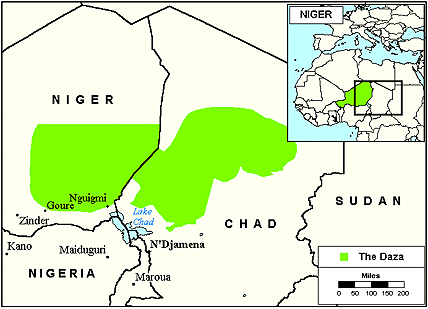|
|
Prayer Profile
The Daza of Niger
![[IMAGE]](../images2/0342.jpg) The 17,200 Daza of southeastern Niger are a rugged, nomadic Muslim people inhabiting the southern fringes of the Sahara Desert. Many more Daza live in neighboring Chad, where they are also referred to as the Goran. Their language, which is called Dazaga, is part of the Nilo-Saharan language family.
The 17,200 Daza of southeastern Niger are a rugged, nomadic Muslim people inhabiting the southern fringes of the Sahara Desert. Many more Daza live in neighboring Chad, where they are also referred to as the Goran. Their language, which is called Dazaga, is part of the Nilo-Saharan language family.
The area in which the Daza live ranges from grassy steppes in the south, to open desert in the north. Temperatures often reach 120 degrees Fahrenheit during the hottest months of the year. Annual rainfall ranges from zero to four inches. The severe conditions under which the Daza live have greatly molded their rugged, fierce character.
The Daza, traditionally a warring people, are still disliked and feared by some of their neighbors. Other Nigerians tend to despise the Daza as thieves and murderers. However, the Daza seem to take pride in their reputation, particularly in their ability to go for long periods of time with little food or water.
What Are Their Lives Like?
The Daza have traditionally been a nomadic, pastoral people, but the population is presently divided between those in rural camps and a lesser number in the small towns. Many have been forced to leave the nomadic lifestyle because of the droughts of recent decades. In the past, the Daza herded cattle, camels, and goats. Cattle are raised less often now, as the Sahara continues to advance southward, destroying the pasture lands necessary for their support.
The basic diet of the Daza consists of cooked millet eaten with a sauce, which usually contains dried tomatoes, onions, and various leaves. Meat is occasionally added to the sauce but is eaten infrequently, as the people are generally poor. Milk is obtained from camels and goats, and dates are cultivated in some areas. Drinking strong, sweet tea is a daily part of Daza social life.
Marriages are often arranged, but couples may have some voice in the matter. Camels, tea, and sugar are usually given as gifts to the bride's family, and gifts are also given to the groom's family. The Daza practice polygamy (have multiple spouses), but many men can afford to have only one wife. Because it is important to have children, a second wife is especially desirable, if the first wife does not conceive. Men are the heads of their families, but Daza women are relatively independent, compared to many neighboring groups. Unfortunately, divorce is common among the Daza.
What Are Their Beliefs?
Being Muslim is a large part of Daza cultural identity, and the Daza are practically 100% Muslim. There is great social pressure to participate in the prayers and the month-long fast during Ramadan, and much attention is paid to the giving of alms. Though staunchly committed to Islam, the Daza do incorporate some animism (the belief that non-human objects have spirits) in their religious activities.
Community adherence to Islam is very stable, but the impact on individual character is not necessarily deep. There is evidence of some are Muslim in name only, especially among the youth; nonetheless, there are still many very sincere, devout Muslims among the Daza.
What Are Their Needs?
Though there are individual exceptions, most of the Daza are very poor. Many Daza lost nearly everything they had during the severe droughts of the mid-1970's and mid-1980's.
There are no medical facilities available to most Daza, and various serious illnesses and diseases abound. Many Daza have access only to contaminated well water, thereby contributing to the health problems.
Divorce, adultery, and prostitution are common social problems among the Daza, despite the relatively high moral standards of Islam. Slavery still exists in Daza society.
The spiritual needs of the Daza are as overwhelming as are the physical needs. Christian resources are scarce and missionaries are few. Intercession and committed workers are necessary to see the Daza of Niger come to Jesus.
Prayer Points
- Ask the Lord of the harvest to send medical missionary teams to work among the Daza of Niger.
- Ask the Holy Spirit to grant wisdom and favor to the missions agency that is targeting the Daza.
- Pray that God will reveal Himself to the Daza through dreams and visions.
- Take authority over the spiritual principalities and powers that have kept the Daza bound for many generations.
- Ask God to raise up a mighty army of prayer warriors who will intercede for the Daza.
- Pray that Christian radio broadcasts, evangelical literature, and the Jesus film will be made available to the Daza.
- Pray for the conversion of influential Muslim teachers and tribal chiefs among the Daza.
- Ask the Lord to establish a strong local church among the Daza of Niger.

Statistics
Latest estimates from the World Evangelization Research Center.
THE PEOPLE
- People name: Daza
- Country: Niger
- Their language: Dazaga
- Population:
- Largest religion:
- Christians: <1%
- Church members: 2
- Scriptures in their own language: None
- Jesus Film in their own language: None
- Christian broadcasts in their own language: None
- Mission agencies working among this people: 1
- Persons who have heard the Gospel: 1,500 (9%)
- Persons who have never heard the Gospel: 15,700 (91%)
THEIR COUNTRY
- Country: Nigeria
- Population:
- Major peoples in size order:
- Major religions:
- Number of denominations: 114
© Copyright 1997
Bethany World Prayer Center
This profile may be copied and distributed without obtaining permission
as long as it is not altered, bound, published
or used for profit purposes.
![[HOME BUTTON]](../graphics/home.jpg)
![[CALENDAR BUTTON]](../graphics/calico.jpg)
![[LIST BUTTON]](../graphics/listico.jpg)
[Home]
[Calendar]
[Country List]
|